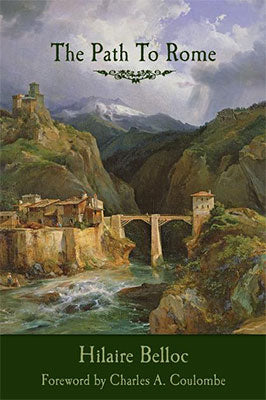World renowned and praised Catholic writer Hilaire Belloc writes a tale of wonder, pain, joy, sorrow, and excitement all the while being vain, sarcastic, and fallen. The Path to Rome is more or less a written account of Belloc's pilgrimage from Lorraine, France (just south of Belgium, where the Maginot line is) to the gates of the Eternal City; Rome, Italy. In it, he describes what he sees, like the varies mountains and forests and rivers he crosses; whom he interacts with, from the humblest peasants to aspiring socialites and innkeepers; the recalling of old memories, either from his days in the French army or time abroad; and various exchanges that occur between the "Lector" and "Auctor". While traveling in more or less a straight line, Belloc passes through France, Switzerland, and finally, Italy; each with their own stories to tell. There are times where the book can get repetitive with the same old: walked this far, experienced this slice of the world, some story to tell, finding a village/ inn, eating/drinking/and socializing, finding a place to sleep, sleeping for a time, and leaving before dawn. While it may sound boring, Belloc is aware of this and acknowledges and remedies it throughout the novel, such as various drawings to display maps, items, buildings, etc. The various references or quirks or nudges Belloc writes and conveys are more than enough to retain the reader's interest in such a wonder of a book. In my humble opinion, this truly lives to be Hilaire Belloc's greatest work.
To me this book is a cross between a traveler's guide (think of The Travels of Marco Polo), an autobiography, and a fiction story. This novel really comes across as a coming of age to man; in essence what is it like to be human and understanding oneself better. This book reads like the life of a man in his late 20's finalizing how he will lead the rest of his life. There is such youth and vigor and suffering and sorrow that makes this work feel alive, feel human. It's hard to explain but the journey is best told with the "Lector" and "Auctor" roles in the book. There are no traditional chapters, only long or short accounts/ stories Belloc tells (separated by *******), so the only notion is when every so often the story is interrupted by the character Lector (in some cases Auctor). At first this caused annoyance and confusion, but later on it dawned on me that this portion of the story serves as a Belloc's own reality check to us readers to 1) keep us from boredom and 2) keep us engaged and grounded in reality. All in all, I quite enjoyed it, but I will say that, due to know chapters, reading a predetermined amount each session will help enjoyment of the novel and keeping fatigue to a minimum. Also, Belloc travels from Lorraine and not Southern France which I found intriguing. Overall, the 5 stars is well deserved, in my humble opinion.

